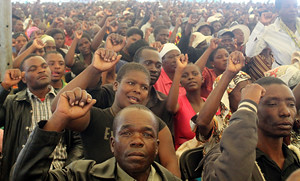
Thousands of Zimbabweans gather at Mt. Carmel High School to oppose the ongoing sanctions against the Southern African state. Sanctions were imposed after land seizure that restored property to the rightful owners., a photo by Pan-African News Wire File Photos on Flickr.
United States confesses
November 7, 2013
Herald Reporters
THE United States has admitted it imposed illegal economic sanctions on Zimbabwe, Finance Minister Patrick Chinamasa said yesterday.
Minister Chinamasa, who was responding to a question on the terms of agreement Zimbabwe has with the IMF under the institution’s Staff Monitored Programme, told the National Assembly that the US government made the admission in meetings he had with officials during his recent visit to Washington.
“As far as I am concerned, we want economies to talk to each other irrespective of our political differences,” he said.
“Actually, during the meetings we had some of the people, they were from the State Department and when I asked them to remove the sanctions, they did not deny that they imposed them, but they gave their reasons on why they are not removing them.
“It is surprising when Zimbabweans themselves who are suffering say that there are no sanctions when those who imposed them are not denying that they imposed them. The argument now is when can they lift them.”
Minister Chinamasa urged Zimbabweans to portray their country positively to ensure a good image to potential investors.
He said the country’s failure to service its debt made it difficult to access further funding and because of that the country had entered into a Staff Monitored Programme under the IMF.
Under the programme, the Government is expected to address macro-economic fundamentals around transparency in minerals’ trade and restructuring of the budget to ensure more resources are allocated for capital projects.
Earlier on, Minister Chinamasa had told the IMF delegation that the fund’s insistence that Zimbabwe must first clear its arrears to unlock financial support was counter-productive.
Zimbabwe, he said, was committed to the implementation of the IMF staff monitored programme as part of initial steps towards full re-engagement with the multi-lateral institution.
But he said officials at the fund should be open-minded and flexible in dealing with the unique situation Zimbabwe finds itself in and consider extending financial support to help the country address its protracted economic problems.
Zimbabwe has not been able to access financial assistance from the IMF since the turn of the millennium as the US sanctions law, the so-called Zimbabwe Democracy and Economic Recovery Act, and its successor, the Zimbabwe Transition to Democracy and Economic Recovery Act, cut the country’s lines of credit from multi-lateral lending institutions with dealings with the US.
The resultant fiscal crunch saw Zimbabwe default on loans from other international lenders and its accumulated external debt has shot up to US$11 billion, with US$4 billion of that being arrears.
“What we have conveyed to them is that we would want to see a relationship that addresses growth (and) attention to the productive sectors.
“We are committed to engaging the Bretton Woods institutions over clearance of our debt so that we get to a point where we are able to enjoy the benefits of our membership.
“We are a member, a serious member and want to engage very constructively and seriously. So, we welcome them for their review. This is the review for end of June and they also obviously will look at the outlook for the 2014 National Budget.”
IMF mission chief of delegation Mr Alfredo Cuevas said they were in Zimbabwe in line with the statutory requirements of the fund.
“We are here to analyse economic policy over the last nine months, analyse economic development over the course of 2013 in the context of the (IMF) staff monitored programme,” he said.
“This is the first programme we have had in Zimbabwe in more than a decade. We are trying to look at how we can continue the conversation over the next two weeks and see what performance we will find under the staff monitored programme.”
No comments:
Post a Comment